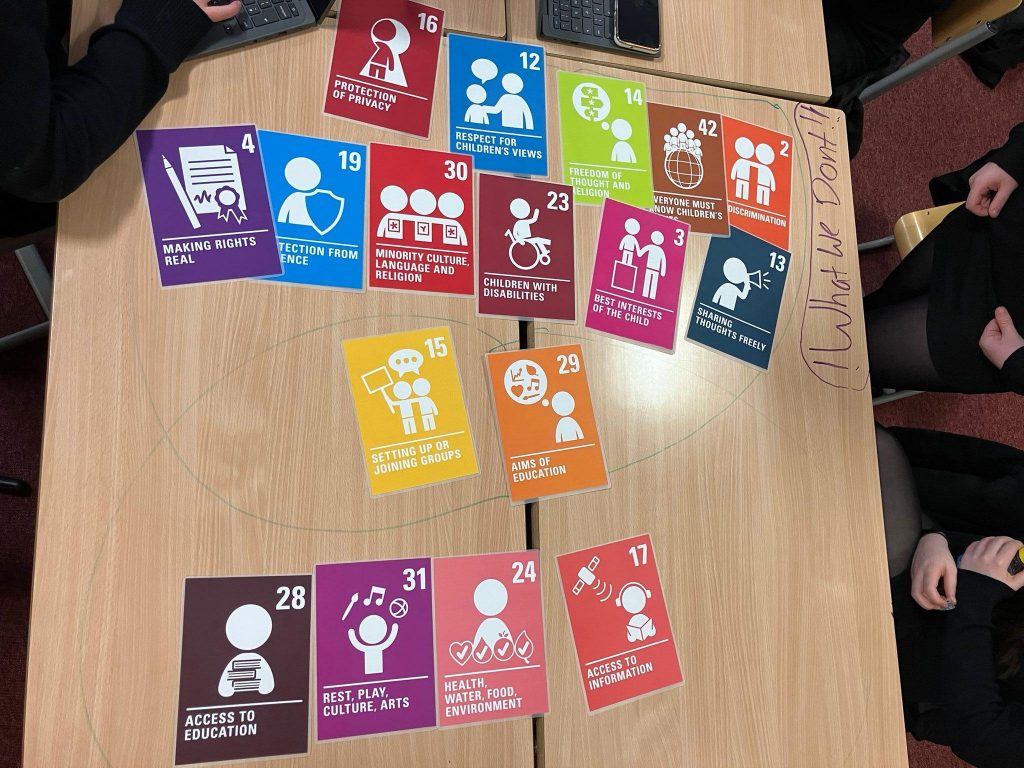Members of Children’s Parliament, in partnership with Strathclyde University and Dr Amy Hanna, engaged in a research project to consider their rights and their application within the context of their school environment. As part of this process, the secondary-school aged Members of Children’s Parliament shared the following to summarise the experience and findings.

During this we got to learn more about our rights – what they are, what they do.
We can now see everything from so many different points of view.
We liked being able to have our voices heard and no one judging us on what we had to say.
We like that we can say what we like and what we don’t like about school.
We liked that we were given independence and responsibility.
The project widened our views on other people’s opinions, and we learnt areas of school that others don’t feel respected in.
We liked the project because we got listened to and our thoughts weren’t put down; they were all listened to, talked about, understood and accounted for.
We realised we aren’t getting everything that we are entitled to. They [adults] say that we’re a school that respects rights, but nobody knows what that really means.
They [adults] say we are experiencing our rights, yet they never talk about them, and when they do people obviously don’t take it in.
We need to learn more about our rights and what they are. This project lets us realise more of our rights.
We learnt that privacy is an issue all around the school, in bathrooms and changing rooms.
We also found out that relationships with teachers can greatly affect the way people learn and feel in a classroom. The teachers who could take a joke and build a relationship with us were people’s favourites.
We heard about bullying and how gender and the way you look can affect how people treat you They [the researchers] told us how teachers are more likely to punish boys than girls, even if the behaviour is the same.
We also realised that a colourful classroom can help the learning environment, but all in all it didn’t affect whether people wanted to come to class or not. It was all about the teacher and the way they made the young people feel.
We realised that most people said they feel most comfortable in the social department.
We heard about people judging when others ask for help and bad language being used nonchalantly.
Anyone of a different race or with a different accent is treated differently. Bullying still happens whether the teachers think it does or not and much of it is undealt with purely because it happens out of school or at a time (like in changing rooms) when there are no teachers. Most people knew how to complain about their problems but were worried they wouldn’t be taken seriously. Many reported that when they come to teachers with an issue of bullying they are told to “come back if it happens again” or teachers say “we will look into it”. Even if adults think this is not the case, this is how people feel. If they got their parents to phone in, the issue would have been dealt with immediately. All our rights are the bare minimum, and we aren’t even getting them all which tell us a lot about how adults need to make a change and they need to make it now.
The adults/teachers need to know that what they are doing isn’t working.
Teachers think they can fix everything, and they have tackled some problems, but lots of things still need fixed.
Teachers need to ask about pupils’ views on how they do things that will affect us.
There is less independence with our learning. Even in P7 we were allowed to work out of class and have an opinion on what we learned and how we learned it. This was taken away in high school because of the lack of trust. People don’t want teachers to try and be their best friend. They want teachers who can have a laugh, but still teach and control the class.
Confidence also made a difference when it came to teachers. A confident teacher can control the class and people can sense that.
We want teachers to treat everyone equally.
We want teachers to listen to what we have to say, actually try and pick what’s best for us, instead of what’s easier for them.
People shove in the corridors and lunch queues, which need to be looked at. Even small things like that can make people feel more scared and less comfortable in school.
Teachers can be manipulative saying things like “do you really need to go to the toilet?” and “are you really sure you need to?” We think this is unacceptable as going to the toilet is a basic human right. If we drink at lunch then we won’t need the toilet straight away, we will need it in the periods after.
They [adults] need to take care of the people who are bullying and doing horrible things to people. We need to sort it out instead of rewarding them for the bare minimum. Many rights that we believe we are not getting may be challenged by adults. They may say that they are “doing things to stop this” and they “put so many measures in place” but if all the people we are interviewing are coming up with the same difficulties, then the measures surely aren’t working. Teachers don’t trust us with basic independence, but we are expected to trust them with our education?
In partnership with Strathclyde University.
Dr Amy Hanna’s Mapping Stories of Children’s Rights Implementation in Scottish Schools is supported by a RSE Small Research Grant
